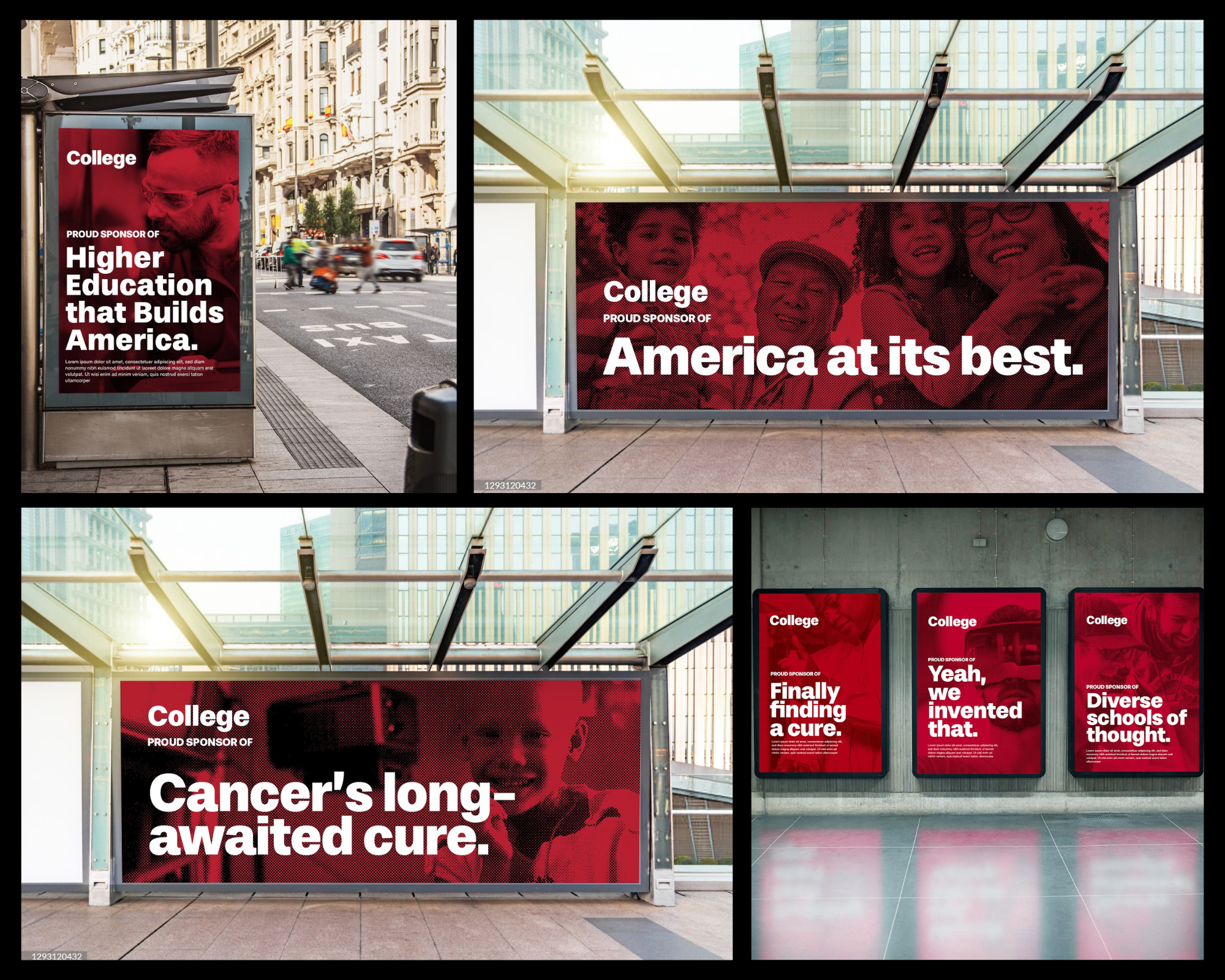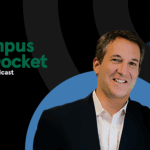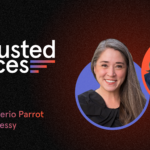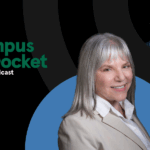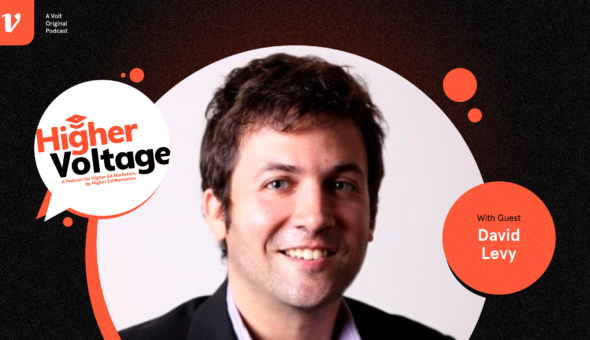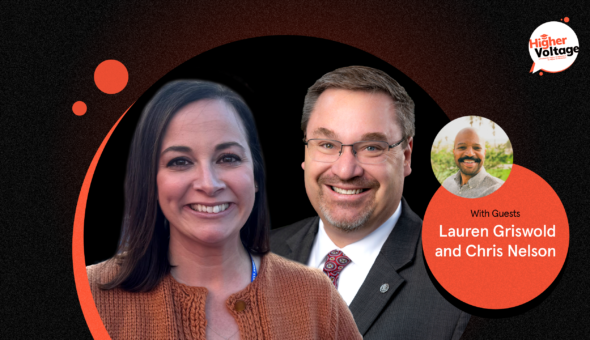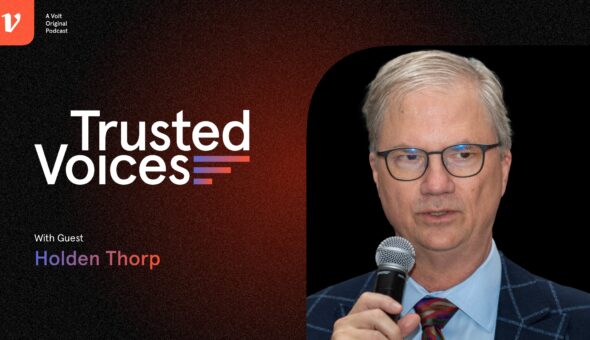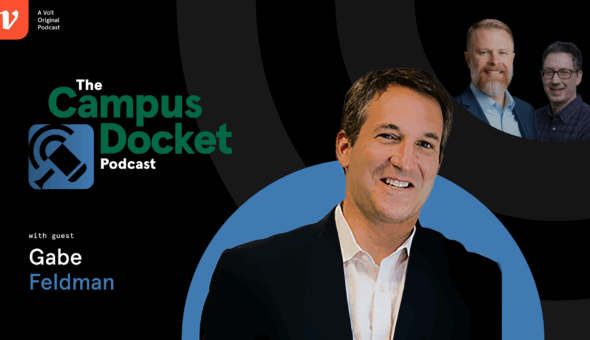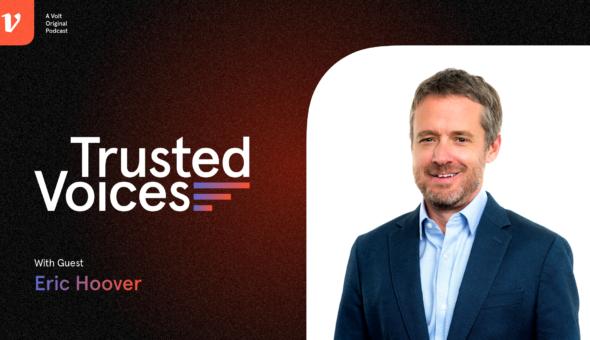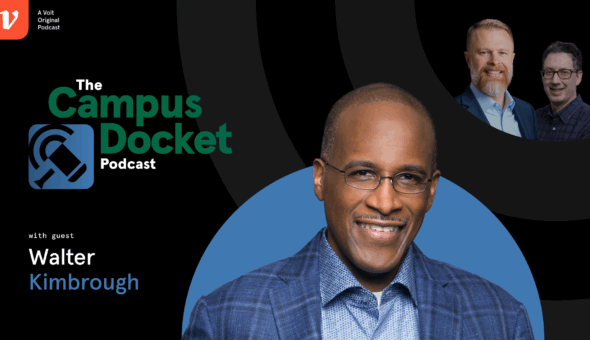Kevin Tyler
Welcome back to Higher Voltage. Listen, today’s conversation is one that is a long time in the making. I’m so excited to welcome Tam Powell and Gary Mueller, both from BVK, to talk about one of the most exciting initiatives, campaigns that is happening in higher education right now. I’m gonna let them talk about that in a little bit, but I wanna introduce you to our guests.
Gary Mueller, writer and creative director at BVK, has built his career on breaking the rules of public health, higher education, tourism, and cause marketing. Mueller’s work has been celebrated everywhere from Adweek and Ad Age and Creativity magazines to Newsweek, CNN, and the New York Times. His writing has also won numerous awards, including the prestigious Kahn Lyon Award and the coveted One Show Pencil. Gary is most proud of his public service efforts. As the founder of Serve Marketing, the country’s only volunteer not-for-profit ad agency, he has helped more than 75 nonprofit organizations improve the lives of those living in Milwaukee’s most at-risk populations.
We also have Tam Powell, SVP for higher education at BVK, also president of the board of directors for Serve Marketing. Tam focuses her efforts on how she and the higher education team at BVK can help clients break through the clutter. Tam is an expert on brand positioning and is responsible for all aspects of marketing, communications, planning and strategy on behalf of BVK’s broad portfolio of higher education clients across the country.
As BVK’s higher education brand champion, her latest endeavor in partnership with BVK’s nonprofit sister agency, Serve Marketing, is producing and launching a national campaign highlighting the impact of higher education in the United States to combat the negative narrative around the value of college. And that is what I am so excited to talk to you both about today. Welcome, Gary and Tam to Higher Voltage.
Gary Mueller
Thanks for having us.
Tam Powell
Thank you. Yeah, we’re excited to be here.
Kevin Tyler
I’m excited to have you here too. Listen, this idea around repositioning the value of higher education as an industry and not from an individual brands is one that’s been sitting on my heart for as long as I’ve been higher education. Before we get into the nuts and bolts of the campaign itself, I would love to learn about its origin story. How did this come to be and how did it get to the world as it is right now?
Tam Powell
Well, it came to be because we work a lot in higher education. And one of the things that we noticed was, we were getting a lot of requests for clients, colleges and universities, but also state systems to tell their story of impact in their particular geography, right? And we would do campaigns, you know, one-off and things like that, but they weren’t really getting the traction that we needed them to get because this really did need to be a national effort. And Gary is the founder of Serve Marketing, which is our not-for-profit sister agency. And so, he’s done a lot of this sort of cause marketing in the past for all sorts of brands and causes around the United States. And so I went to him and said, listen, we need to do something like this around higher education, because we need to speak together with a united voice. There’s been several kind of one-off efforts over the last several years to do this. And until we all do it together, it’s really not gonna have the impact that it needs to have. And so that’s how the idea was born. And then Gary was instrumental in creating the idea of the campaign itself. And I’ll hand over to him to explain how that happened.
Kevin Tyler
That’d be great. Yeah. You can talk about the nuts and bolts of the creation of the campaign.
Gary Mueller
Yeah, I mean, changing the perceptions, the negative perceptions that are out there is gonna be super hard. I mean, we really, we need to first just get out there and start telling our story as an industry and telling it consistently. We basically have to rebrand higher education and we need to go on the offensive first. We’re basically, as an industry, we’re being punched in the mouth by this kind of ongoing negative narrative in the media. As an industry, we’re really not doing anything to fight back. So, and it’s such a shame. Because higher ed has an amazing story to tell. And so, and it’s the story we needed to tell is really that it’s bigger than the individual value of getting a degree. There’s a really a bigger impact to higher education that we all benefit from that impacts all of our lives and the prosperity we enjoy as a nation. And that’s really the story we need to tell. So we developed this national public service campaign to do that, to get our kind of, get our whole industry unified. And it’s called the Proud Sponsor campaign. I came up with it during the NCAA tournament a year ago. And you’re seeing all this stuff, all proud sponsors, proud sponsor that. I said, thought to myself, why can’t college be the proud sponsor of everything that’s, that’s good that’s important to us as a nation. From the economic prosperity we enjoy because of all the innovation that’s always coming out of higher education, to the skilled workforce that drives our businesses and our industry, to the strong military that safeguards our freedom, to our ability to have a functional democracy, to the opportunities it gives people to chase their own version of the American dream. So this campaign does that. And I think it really changes the narrative around college.
To bring this story to life, over the last six months, eight months, we’ve created a series of TV and radio PSAs, social and digital ads, billboards, all that I think really powerfully tell that story, how college is basically the proud sponsor of everything that’s good in America. America is best really. And the campaign is really just starting. We’re just beginning. In fact, we just launched the first media component, which are streaming audio spots nationally on IHAR radio. We have a website, whycollegematters.org, where people can go and learn about the campaign, learn about the bigger value of higher education, and hopefully contact us to become sponsors of the campaign. As we add media partners and sponsors, we’ll continue to roll out other pieces of the media campaign as we go.
Kevin Tyler
Well, first, just want to say congratulations on getting this not just off the ground, but also into the world. I think it is such an important conversation to be having as a person who has marketed and branded individual brands inside of higher ed and then watched the kind of landscape shift where no matter how powerful brand is, all of the negative conversation that’s happening in that brand’s face will never show its true story, its true beauty, and what it can offer its communities that it serves. And so, having this collective kind of big tent approach about the industry as a whole, which is long overdue. But listen, we know that higher education kind of catches up at a different pace than other industries. Changing our philosophy or approach from a reactive one to a much more proactive one is insanely exciting to me. So congratulations on all of the work that has happened so far.
Tam Powell
Thank you. And I do want to point out we approached this as if college were our client.
Kevin Tyler
Exactly!
Tam Powell
We did all the rigor that we would do for a paying client where we did the discovery and we did research and we wrote a brief and we downloaded the creative team and they gave us three concepts and we picked one and we refined it and we tested it. And now we’re making it. So we did all the things. It’s not a bunch of ad people sitting around going, here’s an idea. Like it really is rooted in all the strategy that we do all of our daily business with. And that’s important to understand. And the testing is what has caused a lot of people to get really interested in it because it has moved the needle for how the average American feels about college from being pretty negative to very much more positive, sometimes moving the needle by 10 or more percentage points.
And so that’s something that’s really important. And the other important aspect of this campaign is this is not a prospective student campaign, Kevin. This is not meant to encourage everybody and their brother to go to college. We know that college is not for everybody. The choice should be for everybody. But college may not be for everybody, but the impacts of college are for everybody. And that’s what this campaign is designed to talk about.
Kevin Tyler
Oh my gosh, I am rattling with excitement on this end. I prepare documents for these recordings all the time and wanna be very thoughtful about the directions of the conversation. And the document that I sent to you at first, I had like 25, 30 questions and I was like, I cannot do all of this because I’m so excited about what we’re gonna talk about today. And I just wanna say thank you for taking the time to talk about this effort because I think it’s gonna be so critical for the success of an industry that I know that the three of us love so much.
The notion of that higher education that we talked about using, needing, I guess is a better term, a brand refresh has been batted around for years. I’ve worked at agencies where we started initiatives that sounded the same as what is now live in the world now. And yes, the same idea, put it through the process because that’s the process we know is going to work. And I’m glad that this is now happening. Why do you think that now is the time that the idea is like really truly getting the attention it deserves?
Tam Powell
Well, I think there’s a number of reasons. First and foremost, we’ve all watched with horror as the Gallup perception studies come in, the numbers continue to go in the wrong direction. And so that’s one thing. And then the second thing is really because this has been tried a number of times, there’s sort of this need to get it done collectively and to tell the whole story. And I think one of the reasons why it didn’t take off before, was they were individual initiatives. There was a firm trying to do something on behalf of one single university or college or maybe even a state system. And that’s not enough, right? And also the focus is primarily on the economic impact of the people who get a degree. And that’s a story we all know. Everyone knows that you will earn more in your lifetime if you have a college degree than if you do not.
And so we need to move beyond that as our story and what Gary talked about, how the different impacts of college that we all enjoy as Americans. It’s literally higher education as what has made our country the superpower that it is today. But we’re at risk for losing all that. And I think that’s the biggest reason, Kevin. And contrary to popular belief, this started way before the change in administration. This has been an ongoing issue in the United States of America for a very long time. And we are terrible at telling our own story the way we need to collectively and broadly enough where it’s meaningful to the average citizen who doesn’t have a degree.
Kevin Tyler
One of the things I’m really excited about when it comes to this campaign is that how well it can reinforce some of these other efforts that are state specific that are kind of popping up across the country. When you think about the Idaho’s and the Utah’s and the Tennessee, even maybe the Pennsylvania piece, that consolidation effort, working together across campus lines, if you want to call it that, to try to reintroduce the value of college. What this campaign does is give them a platform from which to launch a new conversation in the state about the value of higher education. And I don’t think that there’s anything more valuable than that, having the backing of something so inclusive, I guess.
Tam Powell
No, that’s a great way to look at it. We look at it like it’s the tide that can lift all the boats.
Kevin Tyler
Absolutely, absolutely. So I’m wondering, because higher ed has been around for so long and people have such long standing opinions and perceptions about that value of it, and they obviously are changing as we’ve talked about already, how do you go about shifting the public’s perception of a higher education in a time that feels so turbulent?
Tam Powell
Yeah, I think it’s an opportunity to tell success stories. Higher education has been around for a really long time in the United States of America. And I think people have forgotten that we have morphed a lot over the years to deliver on skills or needs that our country needed at the time. When we needed to train people how to work in government when we were a brand new nation. When we were coming out of World War I and II, and we needed to retrain people and to get back into the workforce. So the GI Bill and the Pell Grants and land grant universities, because there were agricultural needs and things like that when we needed more teachers. And higher education has constantly been changing to deliver on those needs and now is no different, you know, the pandemic and online learning and all the things that had to change. And so, we have not told the story that sort of breaks that stereotype that we’re slow to move and whatever, right? We have changed massively over time and now we’re a knowledge economy on a global stage. How are we training future leaders for jobs that don’t even exist yet? And higher education is the way by which we do that.
But not only that, that’s only part of the story. So it’s how we’ve changed. That’s a great opportunity to tell stories of success over the years. But it’s also what are the impacts that people get to enjoy even if they don’t get a college degree? The teachers to teach our children, the healthcare workers to take care of our families, the farmers that grow our food, safer bridges, all of those things. We get to enjoy whether we have a degree or not and no one’s telling those stories. So I think it’s an opportunity to tell really powerful stories of impact. And that’s, I think that’s the biggest word when you think about this campaign. This is about the impact of higher education.
Kevin Tyler
Absolutely.
Tam Powell
And we had one version of the campaign concept that Gary’s team pulled together and it was kind of like what life would be like without college. And it was way too depressing to even think about. So we wanted to go a little bit happier direction. Gary, if you want to add to anything I said there, but.
Gary Mueller
Well, I just think that the way we’re telling the story is interesting and fresh and simple. I think when higher ed institutions themselves try to create campaign messaging like this, it’s just very logical, it’s very factual. I think we took the same messaging, the same message, and we gave it kind of a spin that when you see it, when you start to see this stuff, billboards and you see a TV spot, proud college, proud sponsor, college, what do mean college? College can’t sponsor anything. It makes you so curious to find out what this is about because it’s so different. Nobody’s ever thought to do it this way. And I think just kind of the arresting nature of it will get people to pay attention.
Tam Powell
It’s got a little bit of an attitude, a little bit of swagger. And in higher ed, we’ve been taught not to do that, right? That’s not an acceptable thing. So this has just got a little bit of attitude that I like a lot. It’s nice.
Kevin Tyler
It is nice. It’s bold in the right ways. That makes institutions feel comfortable about being a participant in it. And it doesn’t over promise what creatively or in its copy, what is happening here. It’s very straightforward, very easy to understand. And I appreciate that. The drum I tend to bang for anyone who will listen, which is not many people, of course, but it’s that every version of the future, arguably, has come from higher education. Not everyone has gone through higher education to create whatever it is that we are, we now enjoy that you spoke to, Tam, but so many things have the input of a higher education experience to get to us to whatever the next phase of our existence is. This AI piece, I worked at UCLA in comms and the stories of research coming out of UCLA are absurdly compelling. But if I scan this room, the things around me are products of a higher education experience on some level, right?
Tam Powell
Well, just the fact that we can do this podcast being in three different locations and be able to do this is pretty impressive too.
Kevin Tyler
And so the practice of individual institutions talking about the things that are not exactly going to serve the industry, but they’re serving their little pocket of the space, blowing that up and saying, this is what they do over here, this is what they do over here, this is what we’re all doing together to move us to the next chapter of our democracy, of our society, is really exciting to me.
Tam Powell
It’s sort of like if you think about when you do a brand campaign for somebody, you’ve got to talk about the broad promise of the brand first before you start getting into the reasons to believe in the specific things that make you different than somebody else. And so a campaign like this becomes the foundation for then the universities and colleges to go out and do their great work talking about the various particular things that their institution provides and why a student would want to come there versus somebody. So that’s still important work, but this work needs to be done first as a foundation, and we’ve never stopped to do that as an industry.
Kevin Tyler
I think that is an excellent point. It brings to mind the notion that it gives every single institution in America a platform in which to hook in and say, here is the pillars of this campaign. We align, we reflect those things, and here is how we deliver those things. And I think that’s super cool as well.
TVP ad read
Kevin Tyler
I’m curious if you can talk about the measurement here. You already mentioned at the top of the show that you’re moving 10 points here, et cetera. What are you measuring that will make this successful and what signals are you looking for for that success?
Tam Powell
Yeah, and one of the big things we’re going to be watching is that Gallup perception poll. In three to five years, we should really see those numbers start creeping back up the other way in terms of how important people feel higher education is in the United States of America, whether it’s a degree for them or not. Like how important is higher education? That number is going down, especially for people who don’t have a degree and we need to change that. So, how much people want to support that. And that’s not only important on the general citizen level, but the perspective student and influencer level, right? Because if parents are saying, it’s not worth it, don’t go to college. I don’t know if you noticed, but we have an enrollment cliff coming up here in a minute.
Kevin Tyler
I hadn’t heard.
Tam Powell
So, yeah. And so that’s going to make that even harder, right? So we really need to shore this up. So looking at that Gallup poll, we did a brand health study kind of related to this campaign in terms of like how this campaign move the needle in terms of people’s current perception. So we have a little bit of a baseline for us. So we could go back and do the exact same survey in a couple of years and see if it moves the needle that way. But I think we’re gonna really see it in terms of maybe not so many negative headlines at the national level, at every level around higher education, that people want to tell the good stories of impact around higher education and not keep saying we’re too expensive, we’re not accessible, like all of those things. Having a strong support system for higher education will make higher education more affordable because we’ll get more state and federal funding then that increases access. And so it becomes this really positive momentum and that’s what we need. So those are the signals we’re gonna look for and maybe if we just quit feeling like we’re playing defense and more offense, that’ll be another signal out. Like when our clients ask us for things, it maybe won’t be quite so defensive and visible, yeah.
Kevin Tyler
Yeah, I can’t think of another industry where the same talking points are used against it that no one kind of responds to, right? Like we’ve been talking about the price of things for a long time. We’ve been talking about the access of things for a long time.
Tam Powell
Right. Yeah. But there was just an article, I think it was in the Atlantic. Yes. And they were saying, that’s not even right. Higher education hasn’t actually gotten more expensive. If you look at the net sticker price, it has gone down by double digits. We’re not even talking about that. We’re just letting people say we’re getting more and more expensive when in actuality we’re not for the average person. And so we aren’t even refuting that. We’re just letting people tell our narrative for us, and it’s not even accurate.
Kevin Tyler
Yeah, yeah. I’m curious, the three of us have worked with loads and loads of college campuses in our professional lives. And I can think of a couple of obstacles that you may have already experienced or might experience in the future. But I’m curious what your perspective is on some of biggest obstacles you anticipate facing in this work.
Tam Powell
Well, yeah, so that’s one reason we’re doing it this way, because when we’ve tried to do this for an actual client, our hands and our feet are usually tied because we can’t say this and we can’t say that. God forbid we can’t say that. And so this way, we’re like, you know what? Here’s what we know Americans need to hear about higher education. And so these are the things we’re going to say. And so we’re at liberty to say those things. And when we’re pushed on it, like we have five endorsers right now. And one of their questions was, well, can you maybe not say these words or could you maybe switch this image? it’s like, you know what? We tested this with over 2000 adults across the United States from the ages of 35 to 64. And they positively responded to all of these things. So, respectfully, we’re going to go ahead and leave that alone. And we’re gonna show you that this is gonna work. And so it takes away, they’re one step removed from this. So they don’t necessarily have to put their name on it, but they can get behind it in other ways. So it allows them to let this happen without being at risk for some of the blowback. And again, this campaign is meant to be politically agnostic.
Kevin Tyler
Right.
Tam Powell
This is babies and puppies, people, babies and puppies. You may not want a baby or a puppy, but you don’t want anything bad to happen to them unless you’re a sociopath. So, this is what we’re trying to do here is really do something that everyone can kind of rally around and go, yeah, you know, it doesn’t make me want to go to college, but we need to support college because we need teachers or whatever. So that’s kind of what some of the obstacles are, the uncertainty or the fear of just saying what we need to say.
Kevin Tyler
Yeah, I think that’s fair. And I think that higher education has a history of walking on a lot of eggshells around a lot of very important topics and issues, et cetera. And this gives them, as you said, a cover to support a proactive message without having to own or be held accountable for.
Tam Powell
Correct. Yeah, their brand is not on this. So they can say, I really like that without being at risk for that.
Kevin Tyler
Yeah, yeah. So one of the things that came to mind most immediately when I was doing my research for our conversation today is that the marketing of a thing comes after a bunch of other work, right? We have to build the promise and then deliver it for the marketing to be successful. And I’m curious how you’re navigating the business parts of higher education so that the message of it meets the promise.
Tam Powell
Yeah, and that’s part of a lot of the work we do when we do brand work. We do something called brand strategy integration where we make sure that what our clients are saying in the brand expression, in the ads and all the messaging match the experience they have when they get to the campus, right? But we can’t control, especially at this national level, we cannot control the operational side of it. And that’s why in our campaign, we really kind of live above. We’re not promising certain things that we may or may not be able to deliver on. We’re just trying to tell the story, the broad story of higher education and its impact at this very high level, inspirational level, aspirational level. And so I’m hoping that that will actually motivate the folks on the operational side to kind of tweak what they need to tweak to focus on student success and get more students through the pipeline and those sorts of things. We don’t have the ability to control that, but we can create a campaign that still allows you to see the positive and the benefit of it at this higher level while some of those operational issues are being kind of tightened and refined going forward.
And I think it might also inspire them to continue the good work that they’ve been doing because we don’t stop and celebrate what we’ve already accomplished in higher education. And anybody in higher education, especially, you’ve been in it a long time, you watch our video and you will feel damn good about being in this industry.
Kevin Tyler
It’s true.
Tam Powell
And that’s what we need right now because this has been hard, Kevin, you know that. Like this is a hard industry right now. We wake up every day and look at our phones and go, oh my goodness, here we go. So I think it, I hope it will inspire people to stay motivated to do the good work that we’ve been doing all this time.
Kevin Tyler
I love that. And you’re right, the video is incredibly inspiring. Positive thinking, you don’t really get a lot of positivity coming out of higher education for very legitimate reasons. It’s a tough time right now, but it’s nice to have a bit of a touch point to like go to say, oh my gosh, it makes me feel good about what we are doing here.
Tam Powell
And I think the other opportunity we have is as things sort of morph and change in higher education over the next couple of years, our campaign, it’s not meant to be a one and done, right? This is gonna be an ongoing thing. So then we can go back to Gary and the team and say, okay, we need to talk about these things now and we need to continue our storytelling and maybe it gets deeper into what we’re doing for student success or how we’re more accessible to all or all of those things. So this campaign is a broad umbrella that allows us to tell whatever stories we need to tell to support our good work. So I think that’s the other option that it gives us.
Kevin Tyler
Absolutely, absolutely. And speaking of, the campaign is built on a platform of six pillars, national security, economic prosperity, preparing 21st century workforce, American democracy, health, happiness and well-being, and then expanding the American dream. And not to get political here, but you know, the elephant is in the room. Developments at the federal level are creating some urgency around these focus areas. And I’m curious how Proud Sponsor campaign can or will or has responded to the shifting policy landscape to stay in front of the conversation that we’re trying to have.
Tam Powell
I don’t think it changes the mission at all, Kevin. It changes some of the language we have to use around accomplishing that mission. Strong democracy is about having an educated citizenry, right? Where we can have civil discourse and we can have conversations where you’re on one side of the fence and I’m on another and we can learn from each other. I’m not trying to change your mind, you’re not trying to change mine but we leave and we make our own decisions. And that’s what college is supposed to be about. And getting back to that basics of teach you how to think, not what to think is part of having an educated democracy. And we know that people who have a degree tend to vote more, they tend to volunteer, they’re healthier, all of these things. So it becomes this big thing. It just makes our country stronger. We have to address some of these things very carefully and use careful language in some cases. But the idea is we are the strong nation that we are today because of higher education. We are at risk of losing our global competitiveness as a nation. We are now number 40, right? In the world in terms of higher education, we used to be right at the top of the heap. Again, going in the wrong direction. So how do we change that? And so, we just have to delicately dance around that. And American citizens are very divided right now. This just isn’t about administrations. This is about our democracy. And we need to learn to speak a language of impact that we all can nod to and say, yep, that’s important, even if we don’t agree politically. And so that’s what this is trying to do is be this united campaign. Again, back to our babies and puppies, right? We all wanna rally around that, something happy and positive that benefits all of us.
Kevin Tyler
And real, right?
Tam Powell
And real, yeah.
Kevin Tyler
It’s not just about the shiny unicorns, babies and puppies. It’s also like a real conversation happening here about saving the entire industry. And I think that that matters as well. I think that it’s as exciting as it is important. And I love this work that you’re doing. This is…
Tam Powell
Yeah, and there’s national reports coming out about how many jobs we’re going to need in certain sectors. Cybersecurity, AI, engineering, healthcare, we’re not going to have enough workers who are educated enough to take those jobs. And that’s a concern. So again, at the national level, and then you look at the state level, it’s the same thing, different numbers. So, this campaign is meant to help kind of bring awareness to all of those concerns because again, whether you want a degree or not, you still need a neurosurgeon if you need one, right? And you want him or her to be really well trained and educated and ready to go. So, how are we gonna make sure we have those qualified people to take care of us and give us what we need as Americans?
Kevin Tyler
Yeah, yeah. It feels like there is a very critical role for campus leadership in this initiative.
Tam Powell
Oh yeah.
Kevin Tyler
And I’m speaking specifically to presidents and chancellors. And I’m curious if you can just kind of describe from a high level, no need to drop any names or anything unless you want to. I’m just joking. You don’t have to drop any names. What role leaders are playing in this campaign?
Tam Powell
That’s a really tough one because I think you have some bold leaders who are taking stances and you have some that are choosing not to for good reason as well. But I wanna read a quote that was in a Chronicle opinion piece that I just saw this morning and it is amazing. And it says, “We need concerted coordinated action, not individual acts of heroism.” They’re talking about presidents now. “Left to face these threats individually, America’s 4,000 college presidents are fish in a barrel. United by a single strategy, they could be a powerful force. This is that powerful force.” So if we all rally around this messaging, it’ll make everybody’s job easier. Because even if you had a president who’s bold enough to go out there, it’s probably not gonna make enough of a difference and they may not be around to kind of to see it through. Like there’s a lot of pressure out there. So I understand, but all we’re doing is telling the story of higher education and its impacts in a way we’ve never told it before. And if we all do it together, we are a united front and now we are a force. This is a movement, not a campaign. And that’s where we wanna get.
Kevin Tyler
I love that. That’s a perfect positioning. This is a movement, not a campaign. I couldn’t agree with you more. I would imagine, I would imagine that there are other factors that fall outside of the responsibility of BVK, the two of you, and the campaign or movement itself that need to happen in order for this to be as successful as the vision intends it to be. And I’m curious if you can talk about some of those things.
Tam Powell
Yeah, so as Gary pointed out in the beginning, so we created this idea, right? And we’re still trying to produce the video because we need some cold hard cash to finish that off. Right now, the video that you’ve seen is a RIP video made up of shots that we’ve taken for a lot of our clients and put together and some stock shots and whatever to give everyone the idea this is what we’re trying to make. We need corporate sponsors to help, say, I believe in higher education and I want to support this movement because I need an educated workforce from which to choose. Or it’s just a social responsibility initiative we have at [insert corporation here] and we want to support this. So that’s one thing. But before we can really go out and really hit the pavement hard for those kinds of dollars to help us not only produce the campaign, but then have a paid media spend, so people can actually see the campaign, we need to have endorsers. And so that’s where we’re looking inside the industry to say, we need endorsers to say, we believe in this campaign. We want to give you our logo to put on your page. And if we also want to be a supporter, we’d like to get the assets as you produce them. And we’re going to push them out on our social media as well. We’re going to tell a colleague, we’re going to get the word out. We’re going to help you create a viral movement. So we’re starting sort of inside the industry. We got our two first endorsements with the American Council on Education, ACE, and CASE, the Council for Advancement and Support of Education. So two huge influential higher education organizations have announced, we announced that on February the 10th, they are behind this effort. So now we have three more that I’m not at liberty to say just yet, but coming soon to a press release near you, we’re gonna be announcing three more very important endorsers. And now we’re gonna start getting individual colleges and universities. The state of Ohio is behind this with the Inter-University Council and that’s 14 public institutions. So we’re getting a lot of inertia like that. Our endorser page will be very well populated in the coming weeks, that’s going to allow us to go and get those corporate sponsors to get some money to help us pay media and things like that. It’s an effort. And that’s why it’s a movement too, because we need everyone to help us, A, get the word out and B, get the assets out on social media. Or if they want to run it on their paid media schedules to help support what they’re doing, that’s what we need to do. Because while our boss was really generous in letting us create this whole project, we’ve been working on it over a year now with no client, no paid client in sight, he draws a line at asking for $15 million media spend.
Kevin Tyler
Can’t imagine why.
Tam Powell
I know, crazy.
Kevin Tyler
Crazy. I’ll write a strongly-worded letter.
Tam Powell
Thank you.
Kevin Tyler
I am pleased to hear that my home state of Ohio is behind this. I think it’s one of those markets that benefits quite a bit from higher education, as you know, is one of those pockets of institutions that really feed the workforce in the state. And so I’m glad to hear that they’re involved as well.
Tam Powell
Thousand percent.
Kevin Tyler
Yeah. How do people or institutions or corporations, you hear that, corporations, they need some money, get involved with the campaign?
Tam Powell
They can go to our website. We have a place where they can fill out a couple of items and send it in and we’ll call them. And so that’s one of the things that on a podcast like this where anybody who has a contact with a potential corporate sponsor, we do not want to take, even if higher education had money to support this, we do not want to take it. We don’t want it to be higher ed selling higher ed. This is about corporate America believing in higher education and supporting us that way. So, we want to keep that kind of pure as far as from an industry standpoint, we want your endorsement and we want you to help us push things out. And then we’ll look to our corporate friends to help us on that end too, because they benefit a lot from an educated workforce.
Kevin Tyler
Absolutely, absolutely. And the idea of reaching outside of the industry for support, I think is a brilliant approach. I’m not sure when that has ever happened before from an industry perspective. Of course, we have partnerships, et cetera, at individual campuses.
Tam Powell
Sure.
Kevin Tyler
But for an industry to recognize the need for external support, I think is a really brave and necessary thing.
Okay, so, to the two of you, I don’t want this to end. To the two of you, the question that I ask at the end of every interview for Higher Voltage is, what do you think higher education will look like in five or 10 years? And I’m extremely curious about your perspectives here because you will help shape that perception in five or 10 years. And so I’m curious what your response is to that question.
Tam Powell
Do you want to start, Gary? Do you want me to? I’ve been talking the whole time.
Gary Mueller
Well, I think it’s already starting to adapt and change to how fast things are moving. Like you said, higher education has always moved very slowly. I think through necessity, it has to start moving faster. It has to change quicker. And I think that’s what we’re going to be one of the biggest things. I think having more industry experts teach the kids things that they know. I just think that you’re going to see kind of a shift in momentum that way.
Tam Powell
Yeah, and I’d like to see the sense of pride around the, our American system of higher education get really back up to where it should be. I don’t want to apologize. We need to be proud of what we’ve accomplished and how we continue to change. But I’d also like that to be a nonpartisan issue. I’d like for higher education to become something that everybody can agree on and support because it’s that important to the success of this nation going forward, in my opinion.
Kevin Tyler
Man, I couldn’t agree more. What a place to end. Tam and Gary, I really appreciate you joining me today on Higher Voltage for this very important conversation. And in fact, I would love to reserve the right to invite you back once the campaign is out in the world to just kind of revisit with some results and what you’re seeing in the market. This is compelling. It’s important and it’s timely, of course. And so I just want to say thank you for the time today. I had a great time learning more about this campaign. We’ll have as much information about the movement on our episode page.
Tam Powell
Great.
Kevin Tyler
For people to participate, learn more, etc. So, Tam, Gary, thank you so much for joining me on Higher Voltage.
Gary Mueller
Thank you Kevin.
Tam Powell
Thanks for having us, Kevin. We really appreciate it.
